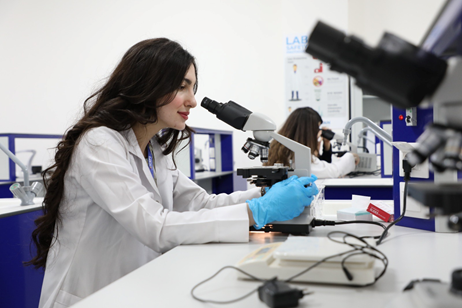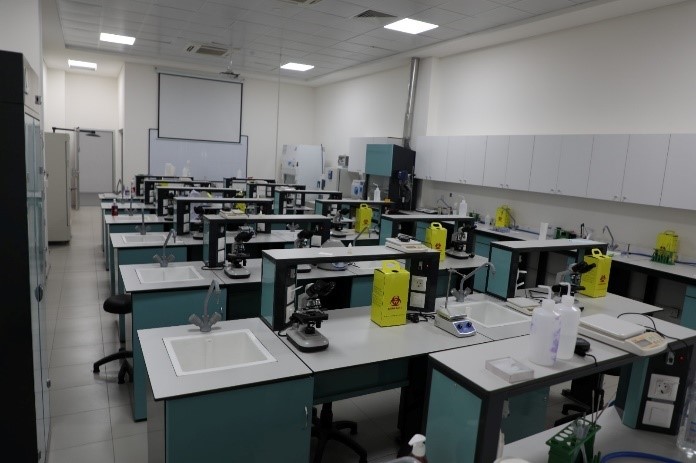The course provides theoretical knowledge and technical competencies in major disciplines of medical laboratory technology. Students will also be exposed to intensive practical training in various laboratory divisions during their clinical internship. Graduates will be awarded a degree in Medical Laboratory Technology upon completion of the academic and clinical requirements.
This academic programme is offered on a full-time basis with a yearly intake. The duration of the study is 4 years/ 8 semesters. Academic activities include lectures, practical hands-on sessions, clinical internships, blended learning, and project-based learning. Continuous assessments and final examinations for both the theory and practical components are used to assess the learning outcomes and required competencies.
The curriculum is planned based on two main semesters and one optional short semester per academic session. Generally, students are expected to undertake courses between seventeen (17) to twenty-eight (28) credit hours per semester or equivalent for credit exemption. Assessment is based on coursework and final examinations given throughout the semester.


| 1 | Awarding Institution | Universiti Teknologi MARA (UiTM) |
|---|---|---|
| 2 | Teaching Institution | Qaiwan International University |
| 3 | Programme Name | Bachelor of Bachelor of Medical Laboratory Technology (Hons.) |
| 4 | Final Award | Bachelor of Bachelor of Medical Laboratory Technology (Hons.) |
| 5 | Programme Code | HS241 |
| 6 | Professional or Statutory Body of Accreditation | Ministry of Higher Education |
| 7 | Language(s) of Instruction | English |
| 8 | Mode of Study (Conventional, distance learning, etc) |
Conventional |
| 9 | Mode of Operation (Franchise, self-govern, etc) | Franchise |
| 10 | Study Scheme: (Full Time/Part Time) |
Full Time |
| 10 | Study Duration | Minimum: 4 years - Maximum: 6 years |
| # | Classification | Credit Hours |
|---|---|---|
| 1 | Compulsory modules | 20 credits |
| 2 | Fundamental Modules, Including Basic Sciences | 15 credits |
| 3 | Professional modules to fulfill requirements of discipline |
72 credits |
| 4 | Industrial training modules Including clinical placement |
17 credits |
| 5 | Optional modules Electives | 12 credits |
| Total Credit Hours to Graduate | 136 credit hours | |
The Programme Educational Objectives (PEO) of the Bachelor of Medical Laboratory Technology are:
PEO (1). Medical laboratory technology practitioners who apply concepts, theories, and knowledge to evaluate, analyze, and solve diagnostic issues.
PEO (2). Medical laboratory technology practitioners who display practical competency in performing laboratory procedures and demonstrate interpersonal skills, social responsibility, and teamwork with other related professions and community, by means of effective communication.
PEO (3). Medical laboratory technology practitioners utilize a broad range of digital technologies to competently analyze laboratory data and validate findings using numerical abilities.
PEO (4). Medical laboratory technology practitioners who demonstrate leadership skills are committed to continuous improvement and display entrepreneurial skills while adhering to ethical and professional practices in the organization and society
| # | PLO | |
|---|---|---|
| 1 | Apply relevant concepts and theories in the field of medical laboratory technology. | |
| 2 | Develop thinking skills in identifying, interpreting, and solving problems associated with laboratory diagnosis. | |
| 3 | Demonstrate technical competency in performing laboratory procedures and reporting results. | |
| 4 | Display effective social responsibilities and collaborative skills when interacting with peers, clients, and stakeholders. | |
| 5 | Demonstrate effective communication by conveying information/ ideas/ reports clearly and professionally. | |
| 6 | Display information communication technology (ICT) skills in utilizing various digital applications to enhance the medical laboratory technology practice. | |
| 7 | Derive skills to utilize numerical, visual, and graphical data, in order to interpret laboratory findings. | |
| 8 | Display leadership skills in managing tasks related to the medical laboratory technology discipline. | |
| 9 | Display lifelong learning skills for continuous professional development. | |
| 10 | Demonstrate entrepreneurial mindsets and skills. | |
| 11 | Display moral values and responsibilities in adhering to ethical principles, standard requirements, professional code of conduct, and regulations in the medical laboratory technology practice. | |
QIU © All Rights Reserved | by QIU IT-Office | @ 2022 QIU University